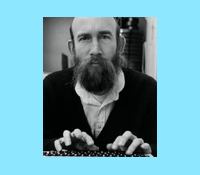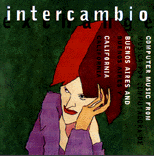
El Camino de Silicio
Click here for the Spanish version.
O Caminho do Silicio
By Regis Rossi Alves Faria (regis@lsi.usp.br)
Click here for the Portuguese version.
The Silicon Highway
(English version)
El Camino de Silicio is an electronic network designed to promote
computer music in
the Americas. It is an extension of a computer
music exchange program between the
Center for Research in Computing
and the Arts
(University of California, San Diego
), the Laboratorio
de Investigación y Producción Musical (Centro
Cultural Recoleta, Buenos Aires), and the
Center for Computer Research in Music and Acoustics
(Stanford University). The exchange program
was funded from 1990-95 by the Rockefeller Foundation.
The network's mission is to foster collaborative research,
music production, and education. It is a project of CRCA's research
associate
Bob Willey
(bobw@carla.ucsd.edu).
 The name for the network derives from
The name for the network derives from
"El Camino Real
El Camino Real" (The Royal Highway),
a coastal road built in
California between 1769-1823.
It went for 600 miles (970 km) from
San Diego to Sonoma,
connecting 21 missions,
4 presidios (forts),
and three pueblos (civilian settlements)
built beside or near it.
Information by Country

Research
Stanford's
research projects
are summarized on
their web pages.
 Music Production
Music Production
A
double compact disk
documenting some of the musical results of the "Intercambio" exchange
between CRCA, CCRMA, and LIPM is available.
An archive of
midi compositions for piano sound and
synthesizer(s)
is stored at CRCA.
The purpose of the NetJam group, Berkeley, is to stimulate
musical collaboration by people all over the world, through organized
sending of Musical Instrument Digital Interface (MIDI) and other files
(like sample data and MAX patchers). The members, styles, equipment,
compositions, and associated documentation are organized as well. A
number of computer platforms are supported (UNIX, Macintosh, IBM-PC,
Amiga, Atari-ST), and means for hardcopy notation and audio
reproduction of the composed music are provided. The NetJam is
available via anonymous ftp from
xcf.Berkeley.EDU
(128.32.138.1)
in the /misc/netjam directory.
Servio Marin (smarin@nunic.nu.edu) organized a
new
music festival in San Diego on April, 1995.
Education
(the pueblos)
A
list of schools offering courses in sound and computer music has been
compiled by Clark Streeter (streeter@nersc.gov). A more
comprehensive list of universities
(with or without electronic music programs)
has been compiled by Christina DeMello.
Stanford University has a few classes available online
by anonymous ftp. The archive includes information on
DSP and the Music Kit.
CRCA has a
few items
available for ftp, including
Bob Willey's
Hypercard Stack called "Introduction to Electronic Music".
This stack is provides the user with a way to compare
the waveform and spectra of basic sounds.
Bob Willey has begun
a collection of
Max patches
at
CRCA and plans to develop online study material.
Other
ftp archives
for Max exist in other locations.
Brent Hugh has collected some references to
educational programs, mostly IBM and for teaching piano.
The
Amsterdam Catalogue of Composition Algorithms
is a database organized by
Alcedo Coenen (alcedo@mars.let.uva.nl)
for composers and programmers
involved in algorithmic composition.
The ACCA project starts December 15 with a seminar at the University
of Amsterdam.
Bob Willey's "Music Resources on the Internet" is a survey
of some popular programs for using the Internet, and examples
of what may be found relating to music. The
paper is on the web
and contains links to other sites.
Computer Music Publications
The
Computer Music Journal Archives are connected with the main publication
for the academic computer music community.
There are many electronic discussions taking place through the
USENET news program.
Computer Music Archives
(the presidios)
The
International Computer Music Association
(ICMA) Software Library
is maintained for the benefit of the computer music community. It
is available by
anonymous ftp
from Dartmouth.EDU and is maintained by Robert Newcomb
(Robert.S.Newcomb@Dartmouth.EDU).
The Pacifica radio network is an important outlet for
contemporary culture.
Carl Stone
(cstone@netcom.com)
has been connected with them for many years and has collected
some of the
playlists
from his programs.
Computer Music Institutions
(the missions)
The
Center for Research in Computing
and the Arts
(formerly the
Center for Music Experiment),
University of California, San Diego.
Home of the Computer Audio Research Laboratory and development
site for cmusic and the CARL software. Presently directed by
visual artist Harold Cohen.
Center for Computer Research in Music and Acoustics (CCRMA) at
Stanford University maintains a
ftp server.
The IRCAM institute in Paris maintains
an archive.
They also have a
Mosaic interface.
"Ostinato", the informational newsletter of the Documentation Center of
Contemporary Music comprizes, among many other
things, detailed lists of concerts and festivals in France (and some abroad),
informations for composers and interpreters, etc.
The CERL Sound Group at the University of Illinois at Urbana/Champaign
maintains a
www server.
The Indiana University Library maintains a extensive list
of
music resources on the Internet.
Bruce Pennycook is the principal investigator behind
McGill University
's
Music Library of the Future. They are working on a new audio
player which will include support for general midi files.
The Mac version of the new Multi-Player should be released in
about 1 month. The PC and X versions about 2 months later.
They hope to link Text, MAPS (scores), MIDI, AUdio, QTime with common
segment points.
A WWW
front end for information on csound is available from Leeds
University. They have the
manual online.
Ruggero Andrea Ruschioni (roger@lsi.usp.br)
reports a
web site at the University of São Paulo's
Laboratório de Sistemas Integráveis
(Laboratory of Integrated Systems).
They also have a
ftp site with binaries for SGI and the major packages for
synthesis. The idea is to provide a site for South America,
it should be faster than connecting to the USA, and they will
soon have fiber-optical connection to the outer world.
Library
A
bibliography
from FAQ sources is available on books relating to computer music.
Craig Latta has compiled a list of
frequently asked questions about electronic music.
Bob McQueer has put together the
MUSENET MIDI Primer
for basic information on the MIDI specification.
Jason Vantomme (vantomme@ILS.NWU.EDU) has compiled a bibliography
on score following research.
The UCSD Music Library maintains a front end with information
about
UC and other music libraries.
Employment
The
Chronicle of Higher Education has web access for
their job listings. Brent Hugh has collected those
relating to
music technology.
crca-www.ucsd.edu/bobw/camino.html | crca | bobw@carla.ucsd.edu
[WITHDRAW]
 The name for the network derives from
The name for the network derives from

 Music Production
Music Production